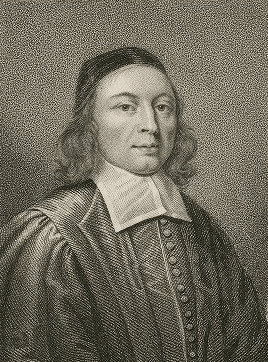John Flavel facts for kids
Quick facts for kids
John Flavel
|
|
|---|---|
 |
|
| Born | 1627 |
| Died | 1691 |
| Nationality | English |
| Alma mater | University College, Oxford |
| Occupation | Presbyterian minister, author |
John Flavel (born around 1627, died 1691) was an English Puritan and a Presbyterian minister. He was also a well-known author.
Contents
John Flavel's Life Story
Early Life and Education
John Flavel was born in Bromsgrove, England, around 1627. He was the oldest son of Richard Flavel, who was also a minister. John went to local schools for his early education. Later, he attended University College, Oxford, where he was known for being smart and hardworking.
Starting His Ministry
In 1650, John Flavel began his work as a minister in Diptford, a town in Devon. He helped the older minister, Mr. Walplate. After Mr. Walplate passed away, John took over the role. He became very popular with the people there. He was kind and fair, especially when it came to collecting tithes (money given to the church).
Moving to Dartmouth
Around 1656, John moved to Dartmouth, even though he earned less money there. He continued his ministry with great dedication.
Challenges for Ministers
In 1662, a law called the Act of Uniformity was passed. This law made it harder for ministers like Flavel to preach freely. Because of this law, he was forced to leave his official position in Dartmouth. However, he kept preaching privately.
Later, the Five Mile Act (1665) made it illegal for ejected ministers to live within five miles of their old churches. So, John moved to Slapton, which was five miles away. Even there, he continued to preach twice every Sunday. Many of his old church members would travel to hear him.
Returning to Dartmouth
In 1671, a special permission called the "indulgence" allowed him to return to Dartmouth. He continued to lead services there. Even when this permission was taken away, he found ways to meet with his community. He even moved to London for a short time for safety.
Eventually, he returned to Dartmouth. He met with his followers secretly in his own home. In 1687, when laws against non-conformist ministers became less strict, his community built a meeting house for him.
Later Years and Death
Just before he passed away, John Flavel led a meeting of other non-conformist ministers in Topsham. He died suddenly in Exeter on June 26, 1691, from a stroke. He was buried in Dartmouth churchyard.
John Flavel's Family Life
John Flavel was married four times during his life. His wives were Jane Randal, Elizabeth Morries, Ann Downe, and finally, a daughter of Reverend George Jeffries.
John Flavel's Written Works
John Flavel was a very busy and popular author. He wrote many books that were well-liked. His writings often showed a creative imagination and strong Christian beliefs.
Some of his well-known books include:
- Navigation Spiritualised, London 1664.
- Antipharmacum Saluberrimum, or a serious and seasonable Caveat to all the Saints in this Hour of Temptation. 1664.
- Tydings from Rome, or England's Alarm. 1667.
- A Saint indeed, London 1668.
- Husbandry Spiritualised, London 1669.
- The Fountain of Life Opened, or a Display of Christ in his Essential and Mediatorial Glory, containing forty-two sermons, London 1672.
- A Token for Mourners, London 1674.
- The Seaman's Companion, London 1676.
- A pathetic and serious Dissuasive from the horrid and detestable Sins of Drunkenness, Swearing, Uncleanness, Forgetfulness of Mercies, Violation of Promises, and Atheistic Contempt of Death. 1677
- Divine Conduct, or the Mystery of Providence Opened, London 1678.
- The Touchstone of Sincerity, London 1679.
- Sacramental Meditations upon divers select places of Scripture, London 1679.
- A Table or Scheme of the Sins and Duties of Believers. 1679
- A Faithful and Succinct Account of some late and wonderful Sea Deliverances. 1679.
- The Method of Grace in the Gospel Redemption, London 1680.
- A Practical Treatise of Fear, wherein the various Kinds, Uses, Causes, Effects, and Remedies thereof are distinctly opened and prescribed, London 1682.
- The Righteous Man's Refuge, London 1682.
- Preparations for Sufferings, or the Best Work in the Worst Times, London 1682.
- Pneumatologia, a Treatise of the Soul of Man, London 1685.
- The Balm of the Covenant applied to the Bleeding Wounds of afflicted Saints. 1688
- England's Duty under the present Gospel Liberty, London 1689.
- Mount Pisgah, or a Thanksgiving Sermon for England's Delivery from Popery, London 1689.
- The Reasonableness of Personal Reformation and the Necessity of Conversion, London 1691.
- Vindiciarum Vindex, or a Refutation of the weak and impertinent Rejoinder of Mr. Philip Carey (a leading anabaptist in Dartmouth). 1691.
- An Exposition of the Assembly's Catechism, London 1692.
- Planelogia, a succinct and seasonable Discourse of the Occasions, Causes, Nature, Rise, Growth, and Remedies of Mental Errors.
- Gospel Unity recommended to the Churches of Christ.
- Vindiciæ Legis et Fœderis.
- A Familiar Conference between a Minister and a doubting Christian concerning the Sacrament of the Lord's Supper.
His writings have been published more than 720 times since 1664.
 | Victor J. Glover |
 | Yvonne Cagle |
 | Jeanette Epps |
 | Bernard A. Harris Jr. |

